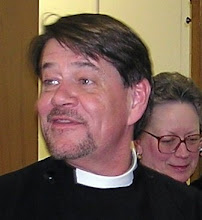
On Sundays and feast days, he became a giant in resplendent brocades lifting his arms as he preached. Or on Easter as a child, I am bedecked in my new finery, and there he is, dressed in white, accompanied by vested acolytes, sweeping along the dusty street on his way to the church; I get not a kiss but a blessing--his hand raised, fingers poised and moving through the air in the shape of a cross. At my father's first parish, the church was right next door; going to church was not a duty but a chance to be with the deepest part of him, to be inside his imagination. In the darkness at the altar rail, I would hold the wafer in my mouth, allowing it to become wet with the wine that burned down my throat. Take, eat, this is my body, my father would say. Just as I came to understand his splendid vestments were not ordinary clothes, I learned that during the Eucharist, the bread and wine were shot through with something otherworldly, something alive that vibrated and trembled, and when I watched my father, enormously tall, the color of his vestments blurry through all the incense in all the candlelight, it seemed to me he brought all this about, up there at the altar, enswirled in the fragrant smoke, the organ thundering, his voice carried by the King James language. It therefore made sense that when he sang Gregorian chant his voice would break and falter. He was being transported by what he called "the presence of God," a force much more powerful than his physical body. What happened to him seemed also to happen in me, behind my eyes, on the surface of my skin, and when it happened, I didn't think of how my mother looked with a baby on her hip, how my younger brothers and sisters screamed, or how awkward I felt at school. Instead, everything became comprehensible--simple, safe, and beautiful.
From the Prologue of "The Bishop's Daughter" by Honor Moore
I can't wait to read this book when it published. Not because of the apparent scandal it is supposed to bring to light, but because Honor Moore writes so eloquently for the secular media about things like the Eucharist, Easter, the mystery of Episcopal worship that draws us in and keeps us coming back.
No doubt Paul Moore (who's stature alone was formidable) had clay feet. So what? What is maybe most compelling about the promise of this book is that we will get to see a human being in all his brokenness and in all his magnificence. The Church is awash in "Tsk Tsk's" about his apparent affair with a young man with whom he had a pastoral relationship and I do not want to seem like I condone that, but I also know that good human beings do bad things sometimes---one only need crack the pages of scripture to see Moses' murderous act, David's infidelity, and Peter's denial. Redeemed humans do bad things for which we mourn, but it should not eclipse the good and shining moments where they transformed their world with redemption.
Paul Moore was/is a hero for me. His untiring placing himself on the line for justice and peace, his work to alleviate poverty and injustice, his votes for progressive policies in the House of Bishop's, his courageous ordination of Ellen Barrett (the first openly gay person ordained amid widespread publicity), starting the Urban Bishop's Coalition which gave birth to the Urban Caucus, and others too numerous to count. Paul Moore above all else did the work Jesus called us to do. Even through his woundedness the Light could shine through the cracks and gaps.
As a parent, a clergy person and a gay man I will want to read this book and give a copy to my daughter who undoubtedly has her own story to tell of her parent's brokenness and their transformative work. I am in line line already to read the whole story.



0 Comments:
Post a Comment
<< Home